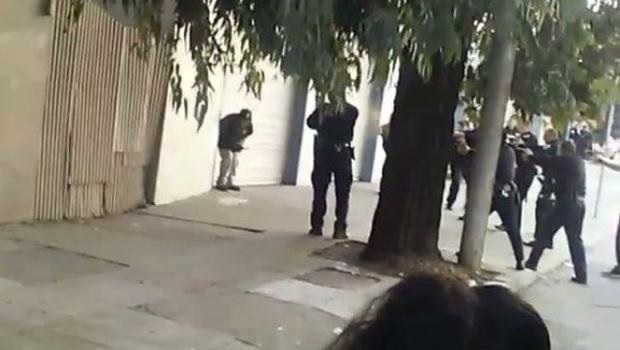When you’re the San Francisco city attorney, you have to defend your client, and sometimes your client is the Police Department, which is getting sued by the family of a young man killed in an inexcusable shooting.

But that doesn’t help the politics of headlines saying that Dennis Herrera found the shooting of Mario Woods to be “lawful.” Neither does the fact that the deputy city attorney handling the case is a former lawyer for the Police Officers Association.
I get it: Herrera has very little choice. He has to find some way to defend the city when its position is, frankly, indefensible.
But you would think the city would be ready to settle, quickly, and keep this out of the courts, where the outcome will only be much, much worse. When someone has a legitimate claim against you, you settle that claim. And this one is pretty clearly legit. Meanwhile, Herrera’s legal filing has already thrilled the POA. Union President Martin Halloran notes:
The conclusions drawn by the City Attorney’s Office are consistent with the position the POA took after the preliminary facts of the investigation became known to us. Since this incident the officers involved, the SFPD as a whole, the Chief, and the POA have been bashed and unjustly vilified by some in City government and by organized groups in San Francisco based on a false narrative and 8 seconds of video. The POA is pleased that the City Attorney is setting the record straight.
Actually, Herrera isn’t “setting the record straight.” He’s making a legal argument, defending the city in a lawsuit, as he is legally required to do. Only a court can “set the record straight,” based on evidence that’s presented.
But it just looks bad.
This case is going to settle. No way Herrera is taking this to trial. And it’s going to cost the taxpayers a lot of money. And I don’t think that number is going to go down as a trial approaches, since the city has essentially zero chance of winning.
The unexpected death of Antonin Scalia puts the US Senate right in the center of the presidential campaign, and raises some interesting questions. For starters, if the Senate won’t confirm anyone Obama nominates – and that’s what some Republicans are saying – the GOP looks really bad. (Meanwhile, some critical cases the right wing thought the High Court would use to do things like disempower unions aren’t going anywhere.)
The stalemate, which leaves a court divided 4-4, means that on most of the key legal issue of the year, the (very mixed) circuit courts of appeal will get the final word. Neither side likes that.
And it might remind voters that there is more than the presidency on the line in November.
Here’s a thought, out of the history books.
In 1980, Ronald Reagan won the presidency in a landslide, carrying 44 states. His coattails were long: For the first time since 1952, the GOP took over the Senate. Such notable Democrats as George McGovern, Birch Bayh, and Gaylord Nelson lost their seats.
In part as a result of that shock, House Democrats from more moderate districts were afraid to challenge Reagan’s agenda, and despite fierce opposition from Speaker Tip O’Neill, Reagan’s first budget passed the House. Although the Dems still controlled that chamber, the Reagan Revolution was in full swing by 1982.
There are lots of arguments about Hillary Clinton and Bernie Sanders, about pragmatics and ideology, about George McGovern losing to Richard Nixon (although Nixon was far more of a centrist on domestic policy than Reagan, who ran with ideas as far to the right as Sanders is to the left and beat an incumbent moderate president).
We’ll let that go for a moment with this concept. The Dems actually have a chance at reclaiming the Senate. But there’s no way Clinton creates a political movement that forces the Republicans to rethink their politics; no way she is the progressive Reagan who will fundamentally change the direction of the country. Maybe with Sanders there’s a chance.
But back to the cops.
The chief thinks the solution to the lethal-force problem is Tasers, and all I can imagine is seeing those half-dozen cops in their firing squad circle surrounding Woods, and all of the firing their Tasers at once, and the young man dying of a heart attack. The problem, as we have pointed out before, is that SF cops seem to be able to ignore existing rules and training with impunity; what makes anyone think they would do better with another type of weapon?
Most of San Francisco government seems to be on Ski Week or something – the Board of Supes isn’t meeting, most committees aren’t meeting, the Planning Commission meeting is cancelled – but there are two items of interest at the Police Commission Wed/17.
The chief will explain his plans for “re-engineering the use of force” at the Police Academy. And the panel will discuss the proposal by Sup. Malia Cohen for an automatic review by the Office of Citizen Complaints for all officer-involved shootings.
Oh, and there will be some debate on the issue of why the cops and the mayor aren’t cooperating with the district attorney’s blue-ribbon panel on police shootings. The commission has been asked to provide the blue-ribbon panel all materials that are given to new commissioners; some of those are, apparently, under attorney-client privilege. So the commission has to vote to waive that.
Should be an interesting discussion. 5:30pm, City Hall room 400.








